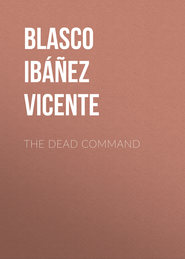По всем вопросам обращайтесь на: info@litportal.ru
(©) 2003-2024.
✖
The Torrent (Entre Naranjos)
Настройки чтения
Размер шрифта
Высота строк
Поля
Dusk was gathering. Leonora ordered the driver to the Plaza de Oriente. She was stopping in one of the houses near the Opera where many theatrical people lodged. She was in a hurry! She had a dinner engagement with that young man from the Embassy, and two musical critics were to be introduced to her.
"And I, Leonora? Are we not to see each other any longer?"
"As far as my door, if you wish, and then … till we meet again!"
"Oh, please, Leonora, stay here a few days! Let me see you! Let me have the consolation of talking to you, of feeling the bitter pleasure of your ridicule, at least!"
Stay a few days!… Her days did not belong to her. She traveled from one end of the world to the other, with her life marked off to the tick of the clock. From Madrid to Lisbon—an engagement at the San Carlos—three performances of Wagner! Then, a jump to Stockholm! After that she was not quite sure where she would go; to Odessa, or to Cairo. She was the Wandering Jew, the Valkyrie galloping along on the clouds of a musical tempest, from frontier to frontier, from pole to pole, arrogant, victorious, suffering not the slightest harm to health or beauty.
"Oh, if you only would! If you would let me follow you! As your friend, nothing more! As your servant, if necessary!"
And he grasped her hand, passionately, thrusting his fingers up her sleeve, fondling the delicate arm underneath her glove. She did not resist.
"There! Do you see, Rafael?" she said, smiling coldly. "You have touched me, and it's useless; not the slightest thrill. You're as good as dead to me. My flesh does not tingle at your fondling. In fact, I find it all decidedly annoying!"
Rafael realized that it was true. She had once trembled madly under his caresses. Now she was quite insensible, quite cold!
"Don't worry, Rafael. It's over, spelled with a capital O. It's not worth wasting a moment's thought on. As I look at you now I feel the way I do when I see one of my old dresses that, in its time, I went mad over. I see nothing but the defects—the absurdities of the fashion that is out of date. Our passion died as it should properly have died. Perhaps your deserting me was for the best. It was better for you to default in the full splendor of our honeymoon than to have broken with me afterwards, when I should have moulded my nature forever to your caresses. We were brought together … oh, by the orange perfume, by that cursed Springtime; but you were not meant for me, nor was I ever meant for you. We are of different breeds. You were born a bourgeois. I am an out-and-out bohemian! Love and the novelty of my kind quite, dazzled you. You struggled hard, you beat your wings, to follow me, but you fell to earth from the very weight of your inherited traits. You have the appetites and the ambitions of people like you! Now you imagine you are unhappy! But you'll find you're not when you see yourself become a personage,' when you count the acreage of your orchards over, when you see your children growing up to inherit papa's power and fortune. This business of love for love's sake, mocking at law and morality, scorning life and peacefulness, that is our privilege, the privilege of us bohemians—the sole blessing left to us mad creatures whom society looks upon—quite properly, I suppose—with disdainful mistrust. Each to his own! The poultry to their quiet roost, where they can fatten in the sun; the birds of passage to their wandering life of song, sometimes in a flowering garden, sometimes in the cold and storm!"
And smiling again, as if those words, uttered with such gravity and conviction, had been too cruel in their effective summary of the whole story of their love, she added in a jesting tone:
"That was a fine little paragraph, wasn't it? What a pity you didn't hear it in time to tack it on at the end of your speech!"
The carriage had entered the Plaza de Oriente; and was drawing up in front of Leonora's house.
"May I go in with you?" the deputy asked anxiously, much as a child might beg for a toy.
"Why? You'll only be bored. It will be the same as here. Upstairs there is no moon, and there are no orange-trees in bloom. You can't expect two nights like that in a life like yours. Besides, I don't want Beppa to see you. She has a vivid recollection of that afternoon in the Hôtel de Roma when I got your note. I'd lose prestige with her if she saw me in your company."
With a commanding gesture she motioned him to the sidewalk. When the carriage had gone they stood there together for a moment looking at each other for the last time.
"Farewell, Rafael. Take good care of yourself, and try not to grow old so rapidly. I believe it's been a real pleasure, though, to see you again. I needed just this to convince myself it was really all over!"
"But are you going like this!… Is this the way you let a passion end that still fills my life!… When shall we see each other again?"
"I don't know: never … perhaps when you least expect it. The world is large, but when a person gads about it the way I do, you never can tell whom you are going to meet."
Rafael pointed to the Opera nearby.
"And if you should come to sing … here?… If I were actually to see you again?...."
Leonora smiled haughtily, guessing what he meant.
"In that case, you will be one of my countless friends, I suppose, but nothing more. Don't imagine that I'm a saint even now. I'm just as I was before you knew me. The property of everybody—understand—and of nobody! But of the janitor of the opera, if necessary, sooner than of you. You are a corpse, in my eyes, Rafael.... Farewell!"
He saw her vanish through the doorway; and he stood for a long time there on the sidewalk, completely crushed, staring vacantly into the last glow of twilight that was growing pale beyond the gables of the Royal Palace.
Some birds were twittering on the trees of the garden, shaking the leaves with their mischievous playfulness, as if the fires of Springtime were coursing in their veins. For Spring had come again, faithful and punctual, as every year.
He staggered off toward the center of the city, slowly, dejectedly, with the thought of death in his mind, bidding farewell to all his dreams, which that woman seemed to have destroyed forever in turning her back implacably upon him. Yes! A corpse, indeed! He was a dead man dragging a soulless body along under the sad glimmering of the first street-lamps. Farewell! Farewell to Love! Farewell to Youth! For him Springtime would never return again. Joyous Folly repelled him as an unworthy deserter. His future was to grow a fatter and fatter paunch under the frock coat of a "personage"!
At the corner of the Calle del Arenal he heard his name called. It was a deputy, a comrade of "the Party" who had just come from the session.
"Let me congratulate you, Brull; you were simply monumental! The Chief spoke enthusiastically of your speech to the Prime Minister! It's a foregone conclusion. At the first new deal you'll be made director-general or undersecretary at least! Again, my congratulations, old fellow!"
THE END
"And I, Leonora? Are we not to see each other any longer?"
"As far as my door, if you wish, and then … till we meet again!"
"Oh, please, Leonora, stay here a few days! Let me see you! Let me have the consolation of talking to you, of feeling the bitter pleasure of your ridicule, at least!"
Stay a few days!… Her days did not belong to her. She traveled from one end of the world to the other, with her life marked off to the tick of the clock. From Madrid to Lisbon—an engagement at the San Carlos—three performances of Wagner! Then, a jump to Stockholm! After that she was not quite sure where she would go; to Odessa, or to Cairo. She was the Wandering Jew, the Valkyrie galloping along on the clouds of a musical tempest, from frontier to frontier, from pole to pole, arrogant, victorious, suffering not the slightest harm to health or beauty.
"Oh, if you only would! If you would let me follow you! As your friend, nothing more! As your servant, if necessary!"
And he grasped her hand, passionately, thrusting his fingers up her sleeve, fondling the delicate arm underneath her glove. She did not resist.
"There! Do you see, Rafael?" she said, smiling coldly. "You have touched me, and it's useless; not the slightest thrill. You're as good as dead to me. My flesh does not tingle at your fondling. In fact, I find it all decidedly annoying!"
Rafael realized that it was true. She had once trembled madly under his caresses. Now she was quite insensible, quite cold!
"Don't worry, Rafael. It's over, spelled with a capital O. It's not worth wasting a moment's thought on. As I look at you now I feel the way I do when I see one of my old dresses that, in its time, I went mad over. I see nothing but the defects—the absurdities of the fashion that is out of date. Our passion died as it should properly have died. Perhaps your deserting me was for the best. It was better for you to default in the full splendor of our honeymoon than to have broken with me afterwards, when I should have moulded my nature forever to your caresses. We were brought together … oh, by the orange perfume, by that cursed Springtime; but you were not meant for me, nor was I ever meant for you. We are of different breeds. You were born a bourgeois. I am an out-and-out bohemian! Love and the novelty of my kind quite, dazzled you. You struggled hard, you beat your wings, to follow me, but you fell to earth from the very weight of your inherited traits. You have the appetites and the ambitions of people like you! Now you imagine you are unhappy! But you'll find you're not when you see yourself become a personage,' when you count the acreage of your orchards over, when you see your children growing up to inherit papa's power and fortune. This business of love for love's sake, mocking at law and morality, scorning life and peacefulness, that is our privilege, the privilege of us bohemians—the sole blessing left to us mad creatures whom society looks upon—quite properly, I suppose—with disdainful mistrust. Each to his own! The poultry to their quiet roost, where they can fatten in the sun; the birds of passage to their wandering life of song, sometimes in a flowering garden, sometimes in the cold and storm!"
And smiling again, as if those words, uttered with such gravity and conviction, had been too cruel in their effective summary of the whole story of their love, she added in a jesting tone:
"That was a fine little paragraph, wasn't it? What a pity you didn't hear it in time to tack it on at the end of your speech!"
The carriage had entered the Plaza de Oriente; and was drawing up in front of Leonora's house.
"May I go in with you?" the deputy asked anxiously, much as a child might beg for a toy.
"Why? You'll only be bored. It will be the same as here. Upstairs there is no moon, and there are no orange-trees in bloom. You can't expect two nights like that in a life like yours. Besides, I don't want Beppa to see you. She has a vivid recollection of that afternoon in the Hôtel de Roma when I got your note. I'd lose prestige with her if she saw me in your company."
With a commanding gesture she motioned him to the sidewalk. When the carriage had gone they stood there together for a moment looking at each other for the last time.
"Farewell, Rafael. Take good care of yourself, and try not to grow old so rapidly. I believe it's been a real pleasure, though, to see you again. I needed just this to convince myself it was really all over!"
"But are you going like this!… Is this the way you let a passion end that still fills my life!… When shall we see each other again?"
"I don't know: never … perhaps when you least expect it. The world is large, but when a person gads about it the way I do, you never can tell whom you are going to meet."
Rafael pointed to the Opera nearby.
"And if you should come to sing … here?… If I were actually to see you again?...."
Leonora smiled haughtily, guessing what he meant.
"In that case, you will be one of my countless friends, I suppose, but nothing more. Don't imagine that I'm a saint even now. I'm just as I was before you knew me. The property of everybody—understand—and of nobody! But of the janitor of the opera, if necessary, sooner than of you. You are a corpse, in my eyes, Rafael.... Farewell!"
He saw her vanish through the doorway; and he stood for a long time there on the sidewalk, completely crushed, staring vacantly into the last glow of twilight that was growing pale beyond the gables of the Royal Palace.
Some birds were twittering on the trees of the garden, shaking the leaves with their mischievous playfulness, as if the fires of Springtime were coursing in their veins. For Spring had come again, faithful and punctual, as every year.
He staggered off toward the center of the city, slowly, dejectedly, with the thought of death in his mind, bidding farewell to all his dreams, which that woman seemed to have destroyed forever in turning her back implacably upon him. Yes! A corpse, indeed! He was a dead man dragging a soulless body along under the sad glimmering of the first street-lamps. Farewell! Farewell to Love! Farewell to Youth! For him Springtime would never return again. Joyous Folly repelled him as an unworthy deserter. His future was to grow a fatter and fatter paunch under the frock coat of a "personage"!
At the corner of the Calle del Arenal he heard his name called. It was a deputy, a comrade of "the Party" who had just come from the session.
"Let me congratulate you, Brull; you were simply monumental! The Chief spoke enthusiastically of your speech to the Prime Minister! It's a foregone conclusion. At the first new deal you'll be made director-general or undersecretary at least! Again, my congratulations, old fellow!"
THE END















